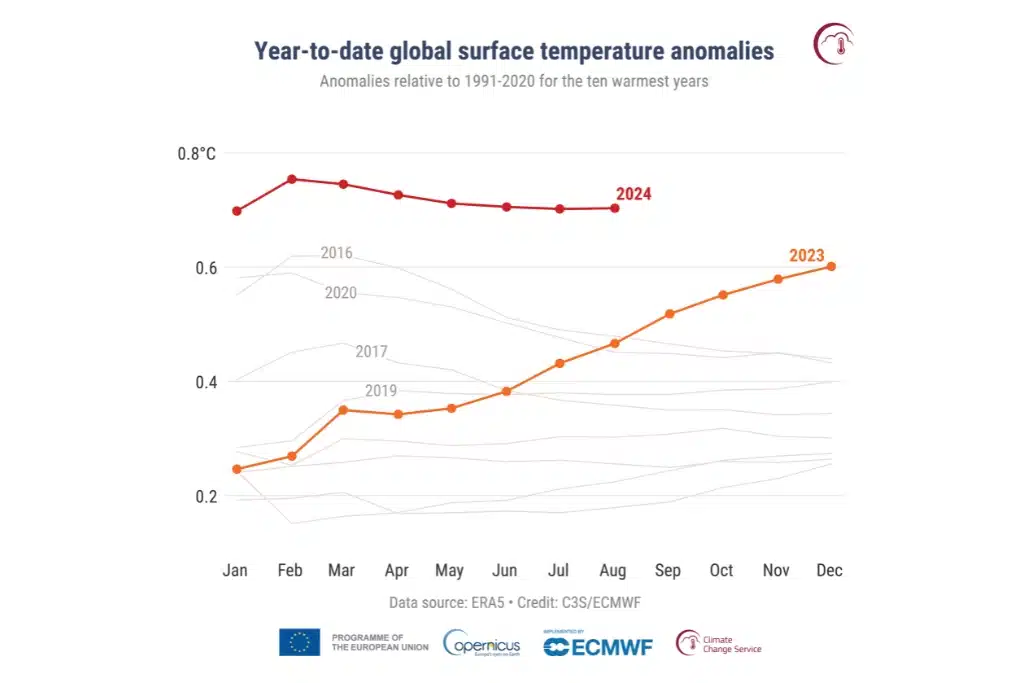
Is 2024 the Hottest Year Ever? European Scientists Say So
We just endured the hottest summer ever, European scientists said.
They confirmed that August was the “joint-warmest” on record together with August 2023. It was 1.51 degrees Celsius warmer than an average August in the pre-industrial era of 1850–1900.
Now, 2024 is on track to be the hottest year ever after a record-breaking summer and the highest year-to-date global average temperature, scientists confirmed on Friday.
The global average temperature between June and August was the highest at 0.69 degrees Celsius, according to the Copernicus Climate Change Service’s (C3S) ERA5 dataset. It’s above the 1991-2020 average for the same period and 0.03 degrees Celsius higher than the previous record set by the last year.
If this sounds familiar to you, it’s because the records the planet shattered all records set just last year due to human-caused climate change. The temperatures also got a temporary push from an El Nino.
El Nino warms the surface waters in the eastern Pacific Ocean. However, Julien Nicolas, a C3S scientist, said its effects were not as strong as they usually are.
Summer 2024 Was the Hottest on Record
The northern meteorological summer — June, July and August — averaged 16.8 degrees Celsius. It’s 0.03 degrees Celsius warmer than the old record set in 2023.
The Augusts of both 2024 and 2023 tied for the hottest Augusts globally at 16.82 degrees Celsius (62.27 degrees Fahrenheit). June 2024 was so much hotter than June 2023, making summer 2024 the hottest, said Carlo Buontempo, Director, C3S.
July also saw two back-to-back record-breaking daily temperatures. July 21 clocked in at 17.09 degrees Celsius. It was the hottest day on Earth since at least 1940, according to the preliminary data from the European climate service, C3S.
July 2024 was also the second-warmest July globally in the C3S data record, with an average ERA5 surface air temperature of 16.91°C. This was 0.68 degrees Celsius above the 1991-2020 average for July, and only 0.04 degrees Celsius lower than the previous high set in July 2023.
According to Samantha Burgess, the Deputy Director at C3S, the past three months of 2024 have experienced the hottest June and August, the hottest day on record, and the hottest boreal summer on record.
“This string of record temperatures is increasing the likelihood of 2024 being the hottest year on record.”
Already in July, scientists said that it was “increasingly likely” that 2024 would be the warmest year yet, beating 2023. According to Carbon Brief, there is a 95% likelihood that this will happen.
The global average temperature anomaly was 0.70 degrees Celsius between January and August. It’s well above the 1991-2020 average and 0.23 degrees Celsius warmer than the previous highest anomaly recorded in 2023.
The anomaly for the remaining months of 2024 would need to decrease by at least 0.30 degrees Celsius for this year not to be warmer than 2023. According to the C3S, it’s a highly unlikely scenario, said C3S.

“What those sober numbers indicate is how the climate crisis is tightening its grip on us,” said Stefan Rahmstorf. Though he is a climate scientist at the Potsdam Institute for Climate Research, he wasn’t part of the research.
Impact of Rising Temperatures
Greenhouse gas emissions caused by human activities are severely warming the planet. Higher temperatures lead to significant consequences for the planet. These consequences are, but not limited to, more frequent and severe weather events, including tropical cyclones, heatwaves, rising sea levels, droughts, melting ice caps, and overall disruptions to biodiversity and the ecosystem.
Recently, flooding from heavy rains in Sudan impacted more than 300,000 people. It also brought cholera to the war-torn country.

Similarly, scientists confirmed climate change intensified Typhoon Gaemi. In July, it tore through the Philippines, Taiwan and China, killing more than 100 people.

According to Burgess, these temperature-related events we witnessed this summer are likely to become more extreme and intense. Moreover, the consequences for people and the planet will be more devastating unless we take immediate action to reduce greenhouse gas emissions.
Subscribe to The Sustainable Brands Journal for more environmental news, stories, and updates.
Sources
- As California swelters, climate officials declare Summer 2024 the hottest on record
- Copernicus: Summer 2024 – Hottest on record globally and for Europe
- Summer 2024 is the hottest on record making it likely this will be the hottest year ever | Euronews
- Record summer temperatures set world on course for hottest year ever | Climate Crisis News | Al Jazeera
- Hottest summer on record could lead to the warmest year ever measured
Recent Posts
- Smart Cities and IoT: How Connected Technology Is Powering Urban Sustainability
- Plant-Based Economy: Beyond Food into Materials and Sustainable Packaging
- Ultimate Guide to ESG Reporting Standards & Frameworks (CSRD, SASB, GRI, TCFD)
- What Is the Circular Economy & Why It’s the Future of Sustainable Business
- How Biodegradable Packaging Is Transforming Retail (With Examples & Benefits)

Prachi, an accomplished Chief-Editor at The Sustainable Brands Journal, has 15+ years of experience in Europe, the Middle East, and India, managing 90+ global sustainable brands. She’s a prolific writer in sustainability, contributing to various publications. Prachi’s unwavering passion and expertise make her a recognized authority, driving positive change and inspiring a sustainable future.





